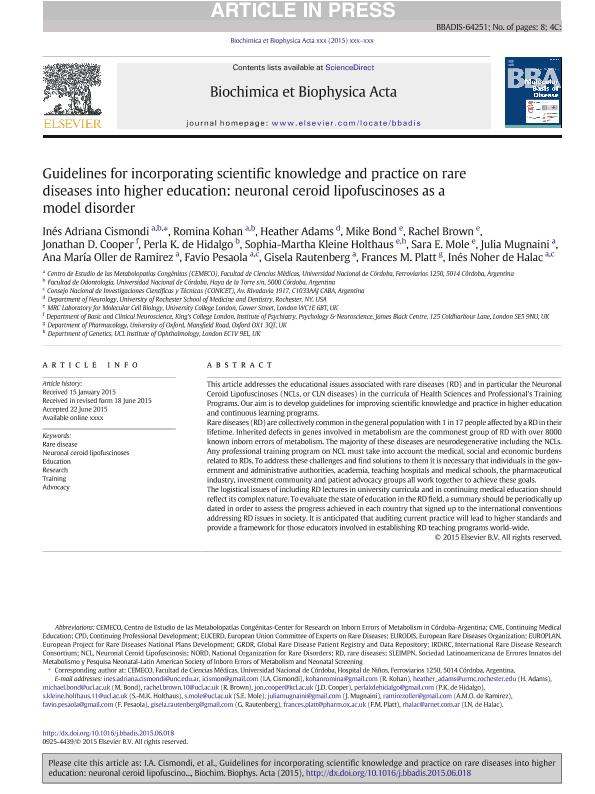Artículo
Guidelines for incorporating scientific knowledge and practice on rare diseases into higher education: Neuronal ceroid lipofuscinoses as a model disorder
Cismondi, Inés Adriana; Kohan, Romina; Adams, Heather; Bond, Mike; Brown, Rachel; Cooper, Jonathan D.; de Hidalgo, Perla K.; Holthaus, Sophia Martha Kleine; Mole, Sara E.; Mugnaini, Julia ; Oller de Ramirez, Ana María; Pesaola, Favio Nicolas
; Oller de Ramirez, Ana María; Pesaola, Favio Nicolas ; Rautenberg, Gisela Evelín
; Rautenberg, Gisela Evelín ; Platt, Frances M.; Noher, Rita Ines
; Platt, Frances M.; Noher, Rita Ines
 ; Oller de Ramirez, Ana María; Pesaola, Favio Nicolas
; Oller de Ramirez, Ana María; Pesaola, Favio Nicolas ; Rautenberg, Gisela Evelín
; Rautenberg, Gisela Evelín ; Platt, Frances M.; Noher, Rita Ines
; Platt, Frances M.; Noher, Rita Ines
Fecha de publicación:
10/2015
Editorial:
Elsevier Science
Revista:
Biochimica et Biophysica Acta - Molecular Basis of Disease
ISSN:
0925-4439
Idioma:
Inglés
Tipo de recurso:
Artículo publicado
Clasificación temática:
Resumen
This article addresses the educational issues associated with rare diseases (RD) and in particular the Neuronal Ceroid Lipofuscinoses (NCLs, or CLN diseases) in the curricula of Health Sciences and Professional's Training Programs. Our aim is to develop guidelines for improving scientific knowledge and practice in higher education and continuous learning programs.Rare diseases (RD) are collectively common in the general population with 1 in 17 people affected by a RD in their lifetime. Inherited defects in genes involved in metabolism are the commonest group of RD with over 8000 known inborn errors of metabolism. The majority of these diseases are neurodegenerative including the NCLs. Any professional training program on NCL must take into account the medical, social and economic burdens related to RDs. To address these challenges and find solutions to them it is necessary that individuals in the government and administrative authorities, academia, teaching hospitals and medical schools, the pharmaceutical industry, investment community and patient advocacy groups all work together to achieve these goals.The logistical issues of including RD lectures in university curricula and in continuing medical education should reflect its complex nature. To evaluate the state of education in the RD field, a summary should be periodically up dated in order to assess the progress achieved in each country that signed up to the international conventions addressing RD issues in society. It is anticipated that auditing current practice will lead to higher standards and provide a framework for those educators involved in establishing RD teaching programs world-wide.
Archivos asociados
Licencia
Identificadores
Colecciones
Articulos(CCT - CORDOBA)
Articulos de CTRO.CIENTIFICO TECNOL.CONICET - CORDOBA
Articulos de CTRO.CIENTIFICO TECNOL.CONICET - CORDOBA
Citación
Cismondi, Inés Adriana; Kohan, Romina; Adams, Heather; Bond, Mike; Brown, Rachel; et al.; Guidelines for incorporating scientific knowledge and practice on rare diseases into higher education: Neuronal ceroid lipofuscinoses as a model disorder; Elsevier Science; Biochimica et Biophysica Acta - Molecular Basis of Disease; 1852; 10; 10-2015; 2316-2323
Compartir
Altmétricas



